November eNews
Third CSO Quarterly Meeting Focuses on Collaboration and Operational Challenges
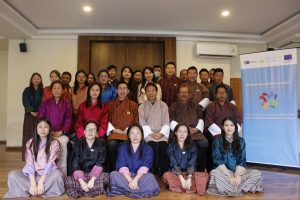
The third Civil Society Organisation (CSO) Quarterly Meeting of 2024 was held on 28th November in Thimphu, bringing together representatives from 30 CSOs to discuss pressing issues and developments impacting the sector. Organised by the Bhutan Centre for Media and Democracy (BCMD) in collaboration with the Civil Society Organizations Authority, DW Akademie Asia, Helvetas Bhutan, and International IDEA, the meeting was supported by funding from the European Union (EU) and Bhutan Transparency Initiative (BTI).
The event was convened by the CSO Representatives to the CSO Authority Board, Mr. Chablop Passu of Bhutan Toilet Organization and Mr. Tashi Namgay of Bhutan Kidney Foundation. Key updates were shared, including aligning CSOs’ Strategic Plans and Annual Work Plans with the 13th Five-Year Plan (FYP) and national priorities. The representatives emphasised the potential of enhancing collaboration between the government and CSOs through improved dialogue at Authority-CSO meetings.
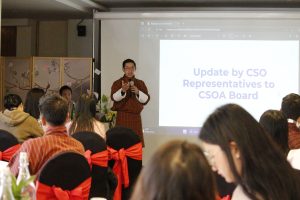
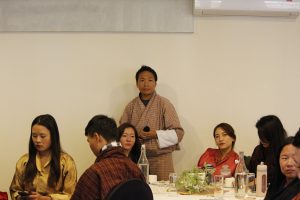
A significant portion of the meeting focused on identifying and addressing operational challenges faced by CSOs. Prominent issues raised included restrictions on fundraising via social media, import taxes on donated assets, and the need to expedite the implementation of the CSO-Government Collaboration Guidelines. Participants also highlighted opportunities to strengthen collaboration within and across thematic groups to address shared challenges and foster collective action.
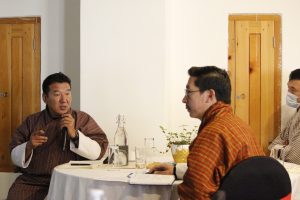
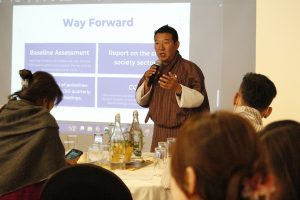
Mr. Chorten Dorji, Executive Director of the Handicraft Association of Bhutan, led a session on the development of guidelines for CSO Quarterly and Annual Meetings aiming to create a framework that caters to the needs of all CSOs in the country. Participants were encouraged to contribute to the guideline development process through thematic group structures to ensure inclusivity and relevance.
The Druk Journal Conversation Sparks Dialogue on a Just and Harmonious Society
Around 90 participants, including students, faculty, and staff from Jigme Singye Wangchuck School of Law and The Royal Academy, gathered at the law school on 13th November for a vibrant discussion on Bhutan’s social challenges. The event, The Suja & Dzaw Conversation, focused on the 20th edition of The Druk Journal, A Just and Harmonious Society.
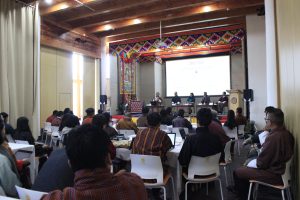
Four contributors to The Druk Journal presented insights from their articles, engaging the audience in a meaningful dialogue about the pressing issues facing Bhutan.
Sanjeev Mehta, presenting the co-authored paper “Inequality in Income, Assets, and Access to Services” with Milan Thomas, highlighted stark income and asset disparities across Bhutan’s dzongkhags despite progress in reducing absolute poverty. Drawing from the Bhutan Living Standards Survey 2022, he pointed to a high-income Gini coefficient of 0.60, emphasising rural-urban divides as a key driver of inequality. Mehta called for targeted policies to address these gaps, particularly through investments in rural infrastructure to improve service access.
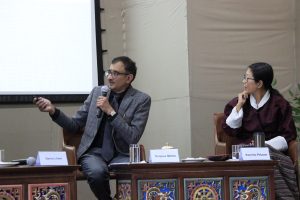
Sanga Dorji, in his article “Towards an Inclusive and Accessible Bhutan: A Vision for Persons with Diverse Disabilities,” shed light on the challenges faced by persons with disabilities, from limited infrastructure to societal stigma. He outlined a comprehensive framework focusing on protecting rights, empowering individuals, and transforming societal attitudes. Sanga stressed the importance of disability-friendly infrastructure, inclusive education, and social protection programmes aligned with international standards, urging collective action to foster a culture of inclusion and respect.
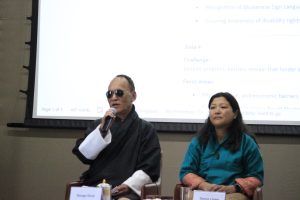
Kencho Pelzom examined the role of hierarchical values in her article “Social Hierarchy and Citizen Engagement in Bhutan.” She explored how Buddhist-influenced traditions like Driglam Namzha (formal etiquette) shape deference to authority, which can stifle citizen participation in democratic processes. While Bhutan has made strides in democratisation, she argued for enhanced civic education and inclusive dialogues to empower citizens to engage more openly, fostering a participatory governance system.
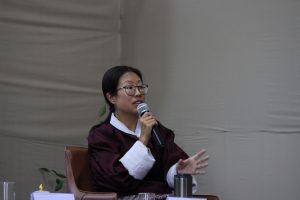
Dema Lham addressed barriers within Bhutan’s justice system in her article “Access to Justice for a Just Society?” Despite constitutional guarantees of equal access to justice, geographic isolation, economic hardships, and cultural factors often hinder marginalised groups. While praising the establishment of the Legal Aid Centre in 2022 as a significant step forward, she stressed the need for greater investment in legal literacy, community outreach, and digital solutions to bridge the justice gap.
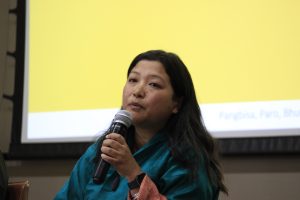
The discussions underscored interconnected themes of equity, inclusivity, and justice, inspiring attendees to reflect on Bhutan’s progress and challenges in building a harmonious society. As Bhutan continues its journey towards Gross National Happiness, the event highlighted the need for collective action to ensure that every individual, regardless of background or ability, has the opportunity to thrive and contribute to a just society.
Children’s Day Celebration
In celebration of Children’s Day on 11th November in Bhutan, BCMD presented a child-centred n educational video on Bhutan’s government structure, detailing the roles and responsibilities of its Executive, Legislative, and Judiciary branches, and that of the local government.
Developed with a focus on learning for the children and youth, this animated video simplifies complex civic concepts, encouraging younger audiences to understand how the government functions to sustain unity and progress in Bhutan. By learning about our government’s workings, young citizens are empowered to engage thoughtfully in their communities, fostering a foundation for active citizenship.
We can watch the video- https://www.facebook.com/bhutancmd/videos/1495532621151708
We thank The Asia Foundation for their invaluable support.
Research Assistants Enhance Advocacy and Media Skills
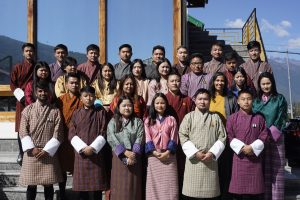
A three-day workshop, Advocacy Skills, Strategic Media Engagement, Research and Policy Review for the research assistants of the National Assembly of Bhutan concluded successfully on 8th November. Organised by the Bhutan Centre for Media and Democracy (BCMD) in partnership with DW Akademie, the workshop was held under the project “Building Inclusive Democracy: Civil Society, Parliamentarians, Media and Youth Strengthen Good Governance in Bhutan,” with funding support from the European Union.
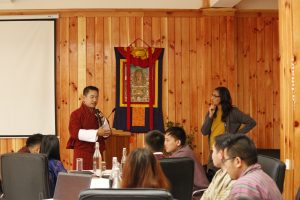
The workshop aimed to enhance the capacity of research assistants to support parliamentarians with evidence-based policymaking and decision-making. It provided comprehensive training in advocacy, research methodologies, policy review, and strategic media engagement, enabling participants to align their roles as parliamentary research officers with the demands of legislative functions.
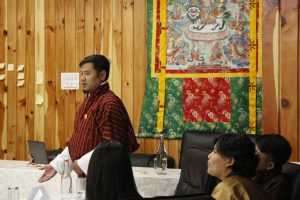
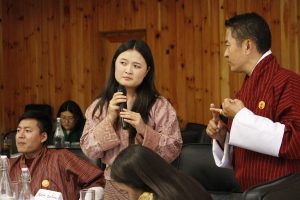
Participants explored various aspects of parliamentary research, including understanding constituency issues, government policies, and legislation. The sessions emphasised the significance of effective communication, teamwork, and stakeholder linkages with civil society organisations (CSOs), non-governmental organisations (NGOs), and local governments. Practical exercises included pre, during, and post-visit procedures for Members of Parliament (MPs) and Local Government sessions, data verification techniques, combating misinformation, and using digital tools for fact-checking.
The training also focused on building strategic alliances, stakeholder engagement, and advocacy planning. Participants delved into key issues such as Bhutan’s timber shortage, pension policies for senior citizens, and promoting electric vehicles while reviewing international policies. Emphasis was placed on ensuring citizen accessibility to policies and fostering public engagement through feedback cycles.
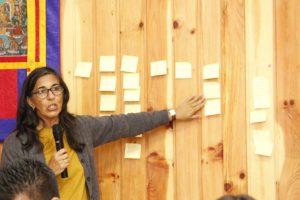
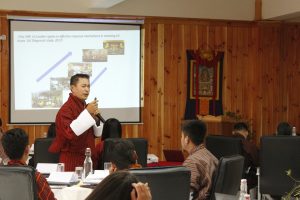
Media engagement sessions provided hands-on training in drafting compelling press releases, creating impactful headlines, preparing media kits, and organizing press conferences. Participants practiced handling crisis communications, managing public narratives, and conducting interviews, alongside mock sessions simulating real-world press interactions. These activities equipped the research assistants with practical skills to ensure transparent and effective communication between the National Assembly and the public.
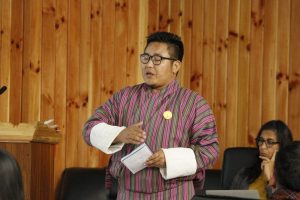
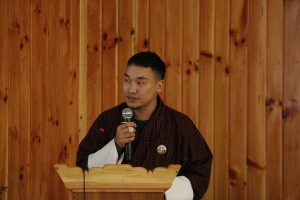
The workshop was co-facilitated by both international and local experts, offering participants a blend of theoretical insights and practical applications. With many research assistants new to their roles, the training provided a timely orientation to their responsibilities, ensuring they are well-prepared to support MPs in their legislative duties and contribute to building a stronger, more inclusive, and transparent government.
